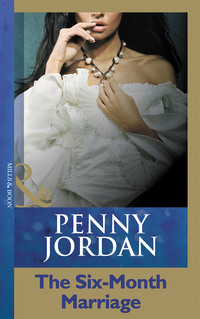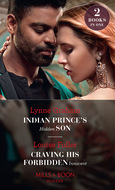Kitap dosya olarak indirilemez ancak uygulamamız üzerinden veya online olarak web sitemizden okunabilir.
Kitabı oku: «The Six-Month Marriage»

Celebrate the legend that is bestselling author
PENNY JORDAN
Phenomenally successful author of more than two hundred books with sales of over a hundred million copies!
Penny Jordan’s novels are loved by millions of readers all around the word in many different languages. Mills & Boon are proud to have published one hundred and eighty-seven novels and novellas written by Penny Jordan, who was a reader favourite right from her very first novel through to her last.
This beautiful digital collection offers a chance to recapture the pleasure of all of Penny Jordan’s fabulous, glamorous and romantic novels for Mills & Boon.
About the Author
PENNY JORDAN is one of Mills & Boon’s most popular authors. Sadly, Penny died from cancer on 31st December 2011, aged sixty-five. She leaves an outstanding legacy, having sold over a hundred million books around the world. She wrote a total of one hundred and eighty-seven novels for Mills & Boon, including the phenomenally successful A Perfect Family, To Love, Honour & Betray, The Perfect Sinner and Power Play, which hit the Sunday Times and New York Times bestseller lists. Loved for her distinctive voice, her success was in part because she continually broke boundaries and evolved her writing to keep up with readers’ changing tastes. Publishers Weekly said about Jordan ‘Women everywhere will find pieces of themselves in Jordan’s characters’ and this perhaps explains her enduring appeal.
Although Penny was born in Preston, Lancashire and spent her childhood there, she moved to Cheshire as a teenager and continued to live there for the rest of her life. Following the death of her husband, she moved to the small traditional Cheshire market town on which she based her much-loved Crighton books.
Penny was a member and supporter of the Romantic Novelists’ Association and the Romance Writers of America—two organisations dedicated to providing support for both published and yet-to-be-published authors. Her significant contribution to women’s fiction was recognised in 2011, when the Romantic Novelists’ Association presented Penny with a Lifetime Achievement Award.
The Six-Month Marriage
Penny Jordan

MILLS & BOON
Before you start reading, why not sign up?
Thank you for downloading this Mills & Boon book. If you want to hear about exclusive discounts, special offers and competitions, sign up to our email newsletter today!
Or simply visit
Mills & Boon emails are completely free to receive and you can unsubscribe at any time via the link in any email we send you.
CHAPTER ONE
‘SAPPHIRE, YOU HAVEN’T heard a word I’ve said. What’s wrong?’ Alan asked her.
The densely blue, dark lashed eyes that were the reason for Sapphire’s unusual name turned in his direction, her brief smile not totally hiding the concern in their dark blue depths.
‘I’ve had a letter from home this morning, and apparently my father isn’t well.’
‘Home?’ Alan gave her a strange look. ‘Funny, that’s the first time I’ve heard you call it that in the four years that you’ve worked for me. Before it’s always been Grassingham.’
Frowning slightly, Sapphire left her desk, pacing restlessly. It was true that in the four years she had worked in London she had tried to wipe her memory clean of as much of the past as she could, and that included any foolishly sentimental references to the border village where she had grown up as ‘home’, but in times of crisis, mental conditioning, no matter how thorough, was often forgotten. Her father confined to bed and likely to remain a semiinvalid for the rest of his life!
Unconsciously she stopped pacing and stared through the large window of her office, but instead of seeing the vista of office blocks and busy London streets all she could see was her childhood home; the farm which had belonged to many generations of Bells and which had been handed down from father to son from the time of Elizabeth the First. But of course her father had no son to carry on farming the land he loved, that was why … Sapphire gnawed worriedly at her bottom lip. In the Borders people adapted to social changes very slowly. Those who lived there had a deeply ingrained suspicion of ‘new ideas’, but had she wanted to do so, she knew that her father would have encouraged her to undertake the agricultural degree needed to successfully run a farm the size of Flaws. However, although she had grown up on the farm she had had no desire to take over from her father.
Flaws valley was one of the most fertile in the area, and should her father decide to sell, there would be no shortage of buyers. But how could he sell? It would break his heart. After her mother had left him he had devoted himself exclusively to the farm and to her. Her mother. Sapphire sighed. She could barely remember her now, although she knew that she looked very much like her.
It was from her American mother that she had inherited her wheat blonde hair and long lithe body, both of which were viewed with a touch of scorn in the Borders.
‘She’s the looks and temperament of a race horse,’ one neighbour had once commented scornfully to her father, ‘but what you need for these valleys is a sturdy pony.’
Acutely sensitive, Sapphire had grown up knowing that the valley disapproved of her mother. She had been flighty; she had been foreign; but worst of all she had been beautiful with no other purpose in life but to be beautiful. Although she had been fiercely partisan on her father’s behalf as a child—after all she too had shared his sense of rejection, for when her mother left with her lover there had been no question of taking a four-year-old child with her—older now herself Sapphire could understand how the valley had stifled and finally broken a woman like her mother, until there had been nothing left for her other than flight.
A farmer’s hours were long hours, and her mother had craved parties and entertainment, whereas all her father wanted to do in the evenings was to relax. Her mother was dead now, killed in a car accident in California, and she … Despite the warmth of her centrally heated office Sapphire shivered. She knew she had never been wholly accepted by her peers in the valley and that was why she had responded so hungrily to whatever scraps of attention she had been given. A bitter smile curved her mouth and she looked up to find Alan watching her worriedly.
Dear Alan. Their relationship was such a comfortable one. She enjoyed working for him, and after the emotional minefields she had left behind her when she left the valley, his calm affection made her feel secure and relaxed. Their friends looked on them as an established couple although as yet they weren’t lovers, which suited Sapphire very well. She wasn’t sure if she was strong enough yet to involve herself too intimately with another human being. As she knew all too well, intimacy brought both pleasure and pain and her fear of that pain was still stronger than her need of its pleasure. Divorce was like that, so other people who had been through the same thing told her. Along with the self-doubts and anguish ran a deep current of inner dread of commitment.
‘Alan, I’m afraid I’m going to have to ask for time off so that I can go and see my father.’
‘Of course. If we weren’t so busy, I’d drive you up there myself. How long do you think you’ll need? We’ve got quite a lot to get through before the end of the month and we’re away for all of March.’
Alan’s small import business had been very successful the previous year and he was rewarding himself and Sapphire with a month’s holiday cruising round the Caribbean; an idyll which Sapphire sensed would culminate in them becoming lovers. Without saying so outright Alan had intimated that he wanted to marry her. Her father seemed to have sensed it too because in his last letter to her he had teased her about the ‘intentions’ of this man she wrote about so often. She had written back, saying that they were ‘strictly honourable’.
‘Don’t worry too much.’ Alan comforted, misunderstanding the reason for her brief frown. ‘If your father’s well enough to write …’
‘He isn’t.’ Sapphire cut in, her frown deepening.
‘Then who was the letter from?’
‘Blake.’ Sapphire told him brittly.
When Alan’s eyebrows rose, she added defensively, ‘He and my father are very close. His land runs next to Flaws Farm, and his family have been there nearly as long as ours. In fact the first Sefton to settle there was a border reiver—a supporter of Mary Queen of Scots, who according to local rumour managed to charm Elizabeth enough to be pardoned.’
‘Do you still think about him?’
For a moment the quiet question threw her. She knew quite well who the ‘him’ Alan referred to was, and her face paled slightly under her skilful application of makeup. ‘Blake?’ she asked lightly, adopting the casual tone she always used when anyone asked her about her ex-husband. ‘We were married when I was eighteen and we parted six months later. I don’t think about him any more than I have to, Alan. He was twenty-six when we were married, and unlike me he knew exactly what he was doing.’
‘I hardly recognise you when you talk about him,’ Alan murmured coming across to touch her comfortingly. ‘Your voice goes so cold …’
‘Perhaps because when I talk about Blake that’s how I feel; terribly cold, and very, very old. Our marriage was a complete disaster. Blake was unfaithful to me right from the start. The only reason he married me was because he wanted Flaws’ land, but I was too besotted—too adolescently infatuated with him to see that. I thought he loved me, and discovering that he didn’t …’
She shuddered, unable to go any further; unable to explain even now the terrible sense of disillusionment and betrayal she had experienced when she discovered the truth about her marriage. It was four years since she had last seen her father, she reminded herself, mainly because she had refused to go home and risk meeting Blake, and her father had been too busy with the farm to come to London to see her. And now this morning she had received Blake’s letter, telling her about the pneumonia that had confined her father to bed.
A terrible ache spread through her body. It hurt to know that her father had been so ill and she had not known. He had not written or phoned to tell her. No, that had been left up to Blake, with the curt p.s. to his letter that he thought she should come home. ‘Although he doesn’t say so, I know your father wants to see you,’ he had written in the decisive, black script that was so familiar to her—familiar because of that other time she had seen it; the day she had discovered the love letter he had written to one of his other women. The tight ball of pain inside her chest expanded and threatened to explode, but she willed it not to. She had already endured all that; she wasn’t going to allow it to return. There was a limit to the extent of mental agony anyone could be expected to suffer, and she had surely suffered more than her share, learning in the space of six months that the husband she worshipped had married her simply because he wanted her father’s land, and that he had not even respected their marriage vows for a week of that marriage. While he left her untouched save for the brief kiss he gave her each morning as he left the farm, he had been making love to other women; women to whom he wrote intensely passionate love letters—love letters that had made her ache with longing; with pain; with jealousy. Even now she could still taste the bitterness of that anguished agony. She had gone straight from discovering the letters to her father, complaining that she did not believe that Blake loved her. Not even to him could she confide what she had found, and when he questioned her, she had simply told him of Blake’s preoccupation; of his darkly sombre moods, of the little time he spent with her. ‘I don’t know why he married me,’ she had cried despairingly, and her father taking pity on her had explained how worried he had been about the future of the farm once he was gone, and how he and Blake had agreed on their marriage, which was more the marriage of two parcels of land than two human beings.
She hadn’t told her father about discovering Blake’s infidelities, and for the first time in her life she had truly appreciated how her mother must have felt. From that to making the decision to leave Flaws valley had been a very short step. Blake had been away at the time buying a new ram and she vividly remembered, tiptoeing downstairs with her suitcase and out through the large flagged kitchen, leaving a note for him on the table. In it she had said simply that she no longer wanted to be married to him. Her pride wouldn’t let her write anything else, and certainly nothing about Miranda Scott who had been one of Blake’s regular girlfriends before he started dating her. She had bumped into Miranda in the library and the other girl had eyed her tauntingly as she told her about the night she had spent with Blake the previous week. Blake had told her that he was buying fresh stock and that he would have to stay in the Cotswolds overnight.
She had asked if she could go with him, thinking that away from the farm she might find it easier to talk to him about her unhappiness with their marriage. In the months leading up to it she had been thrilled by the way he kissed and caressed her and had looked forward eagerly to their wedding night, but she had spent it alone as she had all the nights that followed, and that had been one of the most galling things of all, the fact that her husband didn’t find her attractive enough to want to make love to her.
But he found Miranda attractive—so attractive that he had taken her to the Cotswolds with him.
At first when she reached London she had used an assumed name, terrified that Blake would try to find her, and terrified that if he did, she wouldn’t have the pride or strength of will to refuse to go back to him. Not that she was under any illusions any more that he wanted her. No, he wanted her father’s land!
Those first six months in London had been bitterly lonely. She had drawn all her money out of her bank account before leaving the valley and there had been enough to support her for the first three months while she took a secretarial course. Her first job she had hated, but then she had found her present job with Alan. She had also enough confidence by then to find herself a solicitor. She could have had her marriage annulled—after all it had never been consummated—but she hadn’t wanted anyone to know the humiliating truth—that her husband hadn’t found her attractive enough to want to consummate it—so instead she had patiently waited out the statutory time before suing for divorce. She had half expected, even then, some reaction from Blake but there had been none and their divorce had become final just five months ago.
Sapphire had been in London seven months before she wrote to her father. Before leaving the valley she had posted a letter to him telling him she was leaving Blake, and saying that nothing would make her come back.
With hindsight she could see how worried her father must have been when he didn’t hear from her, but at the time she had been so concerned with protecting herself both from Blake and from her own treacherous emotions that she hadn’t been able to think past them.
“Do you plan to drive North, or will you go by train?’
Jerked out of her reverie by Alan’s voice Sapphire forced herself to concentrate. ‘I’ll drive,’ she told him. ‘There isn’t a direct train service and driving will save time.’
‘Then you’d better take my car,’ Alan told her calmly, ‘I wouldn’t feel happy about you driving so far in yours.’
It was true that her battered VW had seen better times, and Sapphire felt the same warm glow she always experienced when Alan was so thoughtful. Being married to him would be like being wrapped in insulating fibre; protected. Protected from what? From her past? From her foolish adolescent craving for the love of a man who was simply using her? That’s all over now, Sapphire told herself sharply. Blake means nothing to me now. Nothing at all.
‘Look, why don’t you go home now and get yourself organised,’ Alan suggested. ‘You’re too strung up to be much use here, and you’ll need an early start in the morning. Here are my car keys.’ He frowned. ‘No, I’ll go and fill the tank up first. That should be enough to get you all the way there. And when you arrive, ‘phone me won’t you? I wish there was some way I could come with you.’
‘Dear Alan.’ Sapphire rested her head against his shoulder—a rare expression of physical affection for her. ‘You’re so good to me.’
‘Because you’re worth being good to,’ Alan retorted gruffly. Expressions of emotions always embarrassed him, and as she withdrew from him Sapphire wondered why she should remember so clearly the sensual seduction of the words Blake had written; words which still had the power to move her even now, and yet Blake too was a man of few words, but then unlike Alan, Blake’s words were always pithy and to the point. Blake deplored waste of any kind; a true Sefton; and yet there was something about him that had always attracted and yet frightened her. He had spent several years in the army after leaving university. Perhaps that was where he had developed that hard veneer that was so difficult to get past. Sapphire knew that he had been posted to Northern Ireland, and yet his experiences there were something he never did discuss—not even with her father. When she had commented on it once, her father had simply said, ‘There are some things a man can’t endure to remember, and so for the sake of his sanity he forgets them. War is one of them.’
AN HOUR LATER, gripping the cord of the telephone receiver as she waited for someone to answer the ‘phone, she felt her stomach muscles contract with tension. According to Blake’s letter her father didn’t know he had written, so she must try to pretend that she knew nothing of his illness. The ringing seemed to last for ever, and for one dreadful moment Sapphire pictured her father lying in bed, listening to the demanding sound, too ill to do anything about it, but then the receiver was lifted, the ringing abruptly cut off. Relief made her voice hesitantly husky, ‘Dad, it’s Sapphire.’
The cool male voice, edged with taunting mockery, wasn’t her father’s, and the tiny hairs on her arm stood up in prehensile alarm as she recognised it.
‘Blake?’
‘How very flattering that you should recognise my voice so quickly after all this time.’
‘They say people always remember anything connected with acute trauma,’ Sapphire snapped sharply. ‘Blake, I’ve got your letter. My father, how is he?’
‘Why don’t you come home and see for yourself, or are you still running scared?’
‘What of? You? Of course I’m coming h … back, but I can hardly arrive without warning Dad to expect me.’
‘Very thoughtful. Giving him time to kill the fatted calf is that it? I take it you’re coming alone,’ he added, before she could respond. ‘Flaws Farm only has three bedrooms remember; your father’s in one, his housekeeper’s in the other, and I’m sure I don’t need to tell you how the valley will feel about one of its daughters openly co-habiting with a man she isn’t married to—to say nothing of your father’s feelings.’
Gritting her teeth Sapphire responded. ‘I’m coming alone, but only because Alan couldn’t make it. Now may I please speak to my father?’
It was only when Blake put the receiver down that she realized she hadn’t asked him what he was doing at Flaws Farm. He had sounded very much at home, and she bit worriedly at her bottom lip. She had forgotten how freely Blake was used to coming and going in her old home, and if she was forced to endure the constant sight of him how would it affect the calm control she had sheltered behind for so long?
It won’t affect it at all, she told herself angrily. Why should it? Blake had effectively killed whatever feelings she had had for him—and they had only been infatuation—a very deep and intense infatuation agreed, but infatuation nevertheless …
Five minutes later she was speaking to her father, unable to stop the weak tears rolling down her face. Normally they only rang one another at Christmas and birthdays, and it shocked her to hear the hesitancy in his voice.
‘Blake tells me you intend paying us a visit?’
‘If you’ve got room for me. I hear you’ve got a housekeeper?’ Sapphire responded drily.
‘Yes, Mary Henderson. You probably remember her from the old days. She used to nurse at the local hospital. She was widowed a couple of years ago, and her husband left a lot of debts, so she had to sell her house and look for a job. Blake recommended her to me. This is still your home Sapphire,’ he added in a different voice. ‘There’s always a room for you here.’
Without saying it he was making her aware of all the times she should have gone home and hadn’t, because she hadn’t been able to conquer her weakness; her fear of meeting Blake, and discovering that she wasn’t as strong as she had believed. What was she really frightened of though? Blake seducing her? Hardly likely—after all he hadn’t wanted her when they were married, so why should he want her now?
‘Expect me late tomorrow evening,’ Sapphire told him. ‘Alan’s lending me his car, because he doesn’t think my old VW is reliable enough.’ For some reason Sapphire found the silence that followed oddly disconcerting.
‘You’d better use the top road,’ her father said at last. ‘They’ve been doing some roadworks on the other one and there’ve been traffic jams all week just this side of Hawick.’
Mentally revising her plans, Sapphire said her goodbyes. She had planned to drive up the M6 to Carlisle and then take the A7 through Hawick and Jedburgh, rather than using the ‘top road’ which was shorter but which meant driving along the narrow winding road which crossed and re-crossed the Cheviots.
That night, too wide-awake to sleep, she acknowledged that hearing Blake’s voice had disturbed her—dangerously so. The sound of it brought back memories she had struggled to suppress; herself at fourteen watching with shy adulation while Blake worked. Fresh from university he had seemed like a god from Olympus to her and she had dogged his footsteps, hanging on to his every word. Was it then that he had decided to marry her? It was certainly then that he had started to put into practice the modern farming techniques he had learned partially at university and partially during his working holidays in New Zealand into force. Perhaps it was also then that he had first cast covetous eyes on Flaws Farm and mentally calculated the benefits to himself of owning its rich acres in addition to his own. She would never know, but certainly he had been kind and patient with her, carefully answering all her shy questions, tactfully ignoring her blushes and coltish clumsiness. She remembered practically falling off her pony one day straight into his arms, and how she had felt when they closed round her, the steady beat of his heart thumping into her thin chest. From that day on she had started to weave the fantasies about him that had taken her blissfully into their marriage.
At eighteen she had known very little of the world—had only travelled as far as Edinburgh and Newcastle and had certainly not got the sophistication to match Blake. He had left the valley when she was fifteen to join the army and had returned two years later the same and yet different; harder, even more sure of himself and possessed of a dangerous tension that sent frissons of awareness coursing over her skin whenever he looked at her.
The Christmas she was seventeen he had kissed her properly for the first time in the large living room of Sefton House—the large rambling building his great-grandfather had built when a fire had gutted the old farmhouse. There had been a crowd of people there attending a Boxing Day party and someone had produced a sprig of mistletoe. Even now she could vividly remember the mixture of anticipation and dread with which she had awaited Blake’s kiss. She had known he would kiss her. He had kissed all the other girls, but the kiss he gave her was different, or so she had told herself at the time. Her first ‘grown-up’ kiss; the first time she had experienced the potency of sexual desire. His mouth had been firm and warm, his lips teasing hers, his tongue probing them apart.
Restlessly, Sapphire sat up in bed, punching her pillow. She must get some sleep if she was going to be fresh for her drive tomorrow. No doubt if Blake were to kiss her now she would discover that his kisses were nothing like as arousing as she remembered. She had been an impressionable seventeen-year-old to his twenty-five already halfway to worshipping him, and during the brief spring days he had cashed in on that adoration, until by summer he filled her every thought. He had proposed to her one hot summer’s day beside the stream that divided Sefton and Bell land. Blake had wanted to swim, she remembered, in the deep pool formed by the waterfall that cascaded into it. She had objected that she hadn’t brought her suit and Blake had laughed at her, saying that neither had he. She had trembled as revealingly as a stalk of wheat before the reaper, not troubling to hide her reaction. He had pulled her to him, kissing her; caressing her with what she had naively taken to be barely restrained passion. God how ridiculous she must have seemed. Blake’s actions couldn’t have been more calculated had they been programmed by computer, and whatever passion there had been had been for her father’s lands and nothing else.
‘DAMN BLAKE, this is all his fault,’ Sapphire muttered direfully the next morning, as she ate a hurriedly prepared breakfast. Ten o’clock already, and she had hoped to leave at eight, but she hadn’t been able to get to sleep until the early hours and then when she had done she had slept restlessly, dreaming of Blake, and of herself as they had been. Now this morning there was a strange ache in the region of her heart. She couldn’t mourn a love she had never had, she reminded herself as she had done so often during those first agonising months in London, and Blake had never loved her. It had been hard to accept that, but best in the long run. She had once suffered from the delusion that Blake loved her and the penalty she had paid for that folly had warned her against the folly of doing so again.
It was eleven o’clock before she finally managed to leave. The day was crisp and cold, a weak sun breaking through the clouds. February had always been one of her least favourite months—Christmas long forgotten and Spring still so far away, and she was looking forward to her holiday. There was something faintly decadent about going to the Caribbean in March.
A John Williams tape kept her company until she was clear of the City. Blake had had very catholic tastes in music and in books, but it was only since coming to London that her own tastes had developed. Music was a key that unlocked human emotions she thought as she slowed down to turn the tape over. Alan’s BMW was his pride and joy, and although she appreciated his thoughtfulness in lending it to her, she was slightly apprehensive with it.
She had planned to stop for lunch somewhere round Manchester, but oversleeping had altered her schedule, and she glanced at her watch as she travelled north and decided instead to press on to Carlisle and stop there.
She found a pleasant looking pub a few miles off the motorway and pulled up into the car park, easing her tired body out of the car. As she walked in the bar she felt the sudden silence descending on the room, and suppressed a wry grimace. She had forgotten how very conservative northern men were. Even now very few women up here entered pubs alone, but she shrugged aside the sudden feeling of uncertainty and instead headed for the bar, breathing in the appetising smell of cooking food.
The menu when she asked for it proved to be surprisingly varied. She ordered lasagne and retreated to a small corner table to wait for it to be served. While she waited she studied the people around her; mostly groups of men, standing by the bar while their womenfolk sat round the tables. So much for women’s lib, she thought drily, watching them. If she had stayed at home she could well have been one of these women. And yet they seemed quite happy; they were fashionably dressed and from the snatches of conversation she caught even the married ones seemed to have jobs, which to judge from their comments they enjoyed.
A chirpy barmaid brought the lasagne and the coffee she had ordered. The pasta was mouthwateringly delicious. She hadn’t realised how hungry she had been, Sapphire reflected as she drank her coffee, reluctant to leave the warmth of the pub for the raw cold of the February night outside, but she was already late. At last, reluctantly, she got up and made her way to the car, unaware of the way several pairs of male eyes followed her tall, lithe body. She had dressed comfortably for the journey, copper coloured cords toning with a coffee and copper sweater, flat-heeled ankle boots in soft suede completing her outfit. She had always worn her hair long, but in London she had found a hairdresser who cared about the condition of his clients’ hair and now hers shone with health, curving sleekly down on to her shoulders.
The BMW started first time, its powerful lights picking out the faint wisps of mist drifting down from the hills. Living in London insulated one from the elements, Sapphire thought, shivering as she drove out of the car park, and switched the car heater on to boost. She had to concentrate carefully on the road so that she didn’t miss the turning which would take her on to the ‘top road’ and she exhaled faintly with relief when she found it. The mist had grown thicker, condensation making it necessary for her to switch on the windscreen wipers, the BMW’s engine started to whine slightly as the road climbed. She had forgotten how quickly this road rose; the Cheviots were gentle hills compared with some, but they still rose to quite a height. It was an eerie sensation being completely alone on this empty stretch of road, her lights the only ones to illuminate the darkness of the bare hills. Here and there her headlights picked out patches of snow and then visibility would be obscured by the mist that seemed to waft nebulously around her.
Ücretsiz ön izlemeyi tamamladınız.








